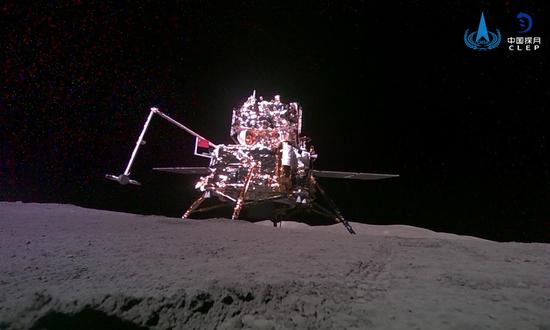Putin signs into law joint building of lunar base with China
Russian President Vladimir Putin on Wednesday officially signed into law his country's cooperation with China on the construction of the International Lunar Research Station (ILRS) project, as Beijing proactively advocates global participation in the joint exploration of the vast universe, with the latest effort being the inclusion of Egypt and Bahrain in China's next Chang'e mission.
The relevant document was published on a Russian official legal information portal on Wednesday, Sputnik reported. Earlier in March, the Russian government submitted to the parliament's lower house a bill to ratify the agreement with China.
Some 12 more countries and international organizations have signed on to the ambitious initiative, Sergey Savelyev, deputy general director for International Cooperation at Russian state space agency Roscosmos, said in May, according to media reports.
This will bring the total number of ILRS partners to more than 30 countries and organizations. The ILRS is already reported to have attracted over 20 signatories from various countries and organizations.
Chinese researchers said that basalt will be considered as a material to build the lunar base, the same material that was used to "knit" the Chinese national flag that was proudly unfurled on the far side of the moon on June 4.
Using local materials on the moon to build the base will save a large amount of costs compared to sourcing materials from the Earth, and the lunar surface is rich in basalt, which can be cut into sheet or tube forms for construction purposes, the Xinhua News Agency reported.
After China carried out a perfect landing of the Chang'e-6 probe on the far side of the moon and brought precious lunar soils back to the Earth, the country's national space administration announced on Tuesday that a payload co-developed by Egypt and Bahrain will board China's next lunar mission - the Chang'e-7, which is scheduled to launch around 2026 to survey the lunar south pole environment, China Central Television reported Tuesday.
The payload is a lunar surface material hyperspectral imaging instrument, the report said.
The international payloads that the Chang'e-7 mission is scheduled to bring include six from seven countries and organizations, namely Egypt, Bahrain, Italy, Russia, Switzerland, Thailand, and the US-based International Lunar Observatory Association.
With China's repeated success in deep space exploration, the prospects for its international cooperation will further expand, Wang Ya'nan, chief editor of Beijing-based Aerospace Knowledge magazine, told the Global Times.
"For one thing, China has, through a series of successful space missions, demonstrated an exceptionally high capability and reliability. This serves as a prerequisite for a good partnership, where richer samples and more ideal scientific results can be better achieved," Wang noted.
Furthermore, China has always maintained an open and inclusive attitude toward international cooperation, which is rare in today's complex global landscape, experts said. While the US is busy chanting the "China threat" rhetoric in a so-called space race, China has been walking steadily step by step and produced rich, concrete results, they noted.
Commenting on China and Russia jointly building the ILRS, Wang said it will have a "whole is greater than the sum of the parts" effect.
Russia's advantage lies in its expertise in astrophysics and chemistry from its past experience with lunar exploration missions during the Soviet era. China can bridge Russia's gap in resources and talents with its abundant economic and engineering advantages.
China's rapid growth in aerospace technology has led to the development of reliable engineering resources, including a space station, various kinds of spacecraft and carrier rockets. With well-planned investments and a growing pool of young talent, China and Russia can complement each other well in the field, Wang said.

